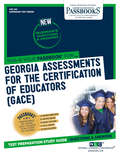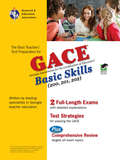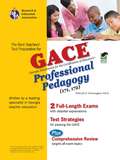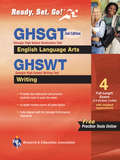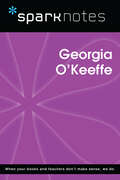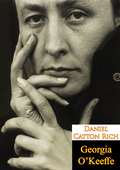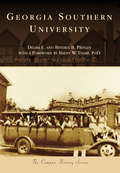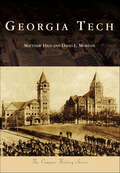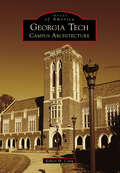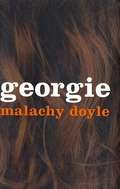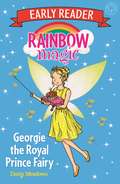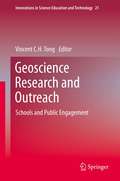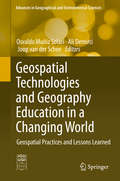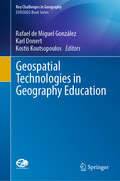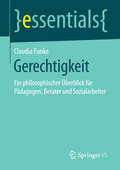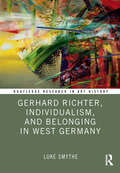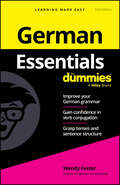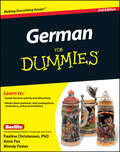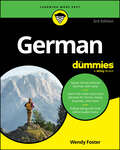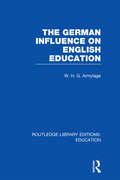- Table View
- List View
Georgia Assessments for the Certification of Educators: Passbooks Study Guide (Admission Test Series)
by National Learning CorporationThe Admission Test Series prepares students for entrance examinations into college, graduate and professional school as well as candidates for professional certification and licensure. The Georgia Assessments for the Certification of Educators (GACE®) Passbook® prepares you by sharpening the skills and abilities necessary to succeed on your upcoming entrance exam. It provides hundreds of questions and answers in the areas that will likely be covered on your upcoming exam.
Georgia GACE Basic Skills
by Judith Robbins Susan FranksGACE Basic Skills Test Prep Puts Georgia Teachers in a Class of Their Own! First Edition! REA's new test prep for the GACE (Georgia Assessments for the Certification of Educators) Basic Skills (200, 201, 202) exam helps teacher candidates get one step closer to teaching in a Georgia classroom. Written by educators who are experts on the content of Georgia's GACE Basic Skills exam, our test prep features every type of question in every subject area that can be expected on the actual GACE. The comprehensive review covers all the necessary skills in each of the three subject areas of the GACE Basic Skills exam: Reading, Mathematics, and Writing. The book contains two full-length practice tests with detailed explanations for every answer, test-taking strategies, a custom study schedule, and more!
Georgia GACE Professional Pedagogy
by Patrick HanniganGACE Professional Pedagogy Test Prep Puts Georgia Teachers in a Class of Their Own!First Edition! REA's new test prep for the GACE (Georgia Assessments for the Certification of Educators) Professional Pedagogy (171, 172) exam helps teacher candidates get one step closer to teaching in a Georgia classroom. Written by an expert on the content of the Georgia GACE exam, our comprehensive review covers all the necessary skills on both of the GACE Professional Pedagogy tests: Test I - Student Development & Learning and Learning Environment. Test II - Instruction & Assessment, and Professional Roles & Responsibilities. Book comes complete with two full-length practice tests with detailed explanations for every answer, test-taking strategies, a custom study schedule, and more!
Georgia GHSGT ELA & GHSWT Writing with Online Practice Tests: Georgia High School Graduation Test - English Language Arts And Georgia High School Writing Test - Wri (Georgia Ghsgt Test Preparation Ser.)
by J. Brice Dana PassanantiGetting Ready for Georgia Graduation Exams? You need REA's GHSGT English Language Arts & GHSWT Writing Test Prep with Bonus Exams Online! If you're getting ready for the Georgia graduation exams and are concerned about your English Language Arts and Writing skills, don't worry. REA's popular Georgia High School Graduation Test (GHSGT) and Georgia High School Writing Test (GHSWT) takes the confusion out of English Language Arts and Writing while helping 11th grade students prepare for this high-stakes exam. Based on Georgia Performance Standards established by the Georgia Department of Education, our test prep provides the instruction and practice you need to succeed on this important graduation exam. The review features student-friendly, easy-to-follow lessons that reinforce the concepts tested on the official exams. Our test prep is ideal for classroom, group or individual study. Targeted drills and examples increase comprehension while enhancing reading and writing skills. The book contains 2 full-length practice tests that allow you to test your knowledge and reinforce what you've learned. Two additional practice tests not found in the book are available online - for a total of four exams! Each unique practice test features diagnostic feedback and detailed explanations of answers. This book is a must for any Georgia student preparing for the GHSGT & GHSWT graduation exams!
Georgia O'Keeffe (SparkNotes Biography Guide)
by SparkNotesGeorgia O'Keeffe (SparkNotes Biography Guide) Making the reading experience fun! SparkNotes Biography Guides examine the lives of historical luminaries, from Alexander the Great to Virginia Woolf. Each biography guide includes:An examination of the historical context in which the person lived A summary of the person&’s life and achievements A glossary of important terms, people, and events An in-depth look at the key epochs in the person&’s career Study questions and essay topics A review test Suggestions for further reading Whether you&’re a student of history or just a student cramming for a history exam, SparkNotes Biography guides are a reliable, thorough, and readable resource.
Georgia O’Keeffe
by Daniel Catton RichThis is the definitive book on Georgia O'Keeffe's work--selected, designed, and supervised by the artist herself, with her own text. It includes 108 magnificent full-color plates, some never reproduced elsewhere or publicly shown, and spans O'Keeffe's entire career: from her intense, personal abstractions to her unique depictions of nature--flowers, bones, rocks, and landscapes.
Georgia Southern University
by Brent Tharp Delma E. Presley Beverly B. PresleyIn 1906, the founders of what would become Georgia Southern University pledged to build a college that would prepare students to succeed in a changing world. The First District Agricultural and Mechanical School served well the needs of women and men who lived in a farm-based economy. As the 20th century unfolded, the college did something that is rare in the history of higher education: it changed its name five times to meet the educational needs of its citizens. A university since 1990, Georgia Southern provides opportunities for a diverse and inclusive student body that now exceeds 20,000. Each year, graduates earn diplomas at the bachelors, masters, and doctoral levels. Today, the road to the future begins on a path that learners long have traveled: it leads up through a green forest to Sweetheart Circle. Old A&M has become one of the nation's distinctive universities. Those who study and teach here say the campus is the most beautiful in America. At its heart is a pair of neatly coupled lakes, framed by historic willows, live oaks, and stately pines. The light of learning still shines brightly from Statesboro's highest hill.
Georgia Tech (Campus History)
by Matthew HildGeorgia Tech has become one of the nation's top-10-ranked public universities and boasts a former U.S. president, TV personality and Hall-of-Fame athletes among its prominent alumni.From humble beginnings as a small technological institute that opened in 1888, Georgia Tech is now renowned throughout the world for its excellence in technological education and research. A top-10-ranked public university, according to U.S. News & World Report rankings, famous Georgia Institute of Technology alumni include Jimmy Carter, G. Wayne Clough, Jeff Foxworthy, Sam Nunn, Randolph Scott, and Leonard Wood, along with many famous athletes. Georgia Tech has won four national college football championships, the first in 1917 under the legendary coach John Heisman. Today, Georgia Tech has a student body of more than 29,000 at the undergraduate and graduate levels and more than 155,000 living alumni. The institute has an annual economic impact of about $3 billion upon Georgia's economy. Authors and Tech alumni Matthew Hild and David L. Morton take you inside the journey of how this institute got to where it is today.
Georgia Tech: Campus Architecture (Images of America)
by Robert M. CraigThe architectural development of Georgia Tech began as a core of Victorian-era buildings sited around a campus green and Tech Tower. During the subsequent Beaux-Arts era, designers (who were also members of the architecture faculty) added traditionally styled buildings, with many of them in a pseudo-Jacobean collegiate redbrick style. Early Modernist Paul Heffernan led an architectural revolution in his academic village of functionalist buildings on campus--an aesthetic that inspired additional International Style campus buildings. Formalist, Brutalist, and Post-Modern architecture followed, and when Georgia Tech was selected as the Olympic Village for the 1996 Summer Olympics, new residence halls were added to the campus. Between 1994 and 2008, Georgia Tech president G. Wayne Clough stewarded over $1 billion in capital improvements at the school, notably engaging midtown Atlanta with the development of Technology Square. The landscape design by recent campus planners is especially noteworthy, featuring a purposeful designation of open spaces, accommodations for pedestrian perambulations, and public art. What might have developed into a prosaic assemblage of academic and research buildings has instead evolved into a remarkably competent assemblage of aesthetically pleasing architecture.
Georgie
by Malachy DoyleWith help from a sympathetic fellow resident, a patient teacher, and other staff at a school for emotionally disturbed teenagers, fourteen-year-old Georgie begins to find his way back to sanity.
Georgie the Royal Prince Fairy (Rainbow Magic Early Reader #15)
by Daisy MeadowsThese cheerful and inviting Early Readers bring the blast of colour that Rainbow Magic's youngest fans have been waiting for!Rachel and Kirsty are very excited to attend a special royal weekend organised by the Queen! But when the Royal signet ring mysteriously disappears, the girls are in for another fantastic Rainbow Magic adventure! Help Kirsty and Rachel find the royal signet ring before it's too late!'These stories are magic; they turn children into readers!' ReadingZone.comIf you like Rainbow Magic, check out Daisy Meadows' other series: Magic Animal Friends and Unicorn Magic!
Geoscience Research and Outreach: Schools and Public Engagement
by Vincent C. TongFrom energy and water resources to natural disasters, and from changing climatic patterns to the evolution of the Earth's deep interior, geoscience research affects people's lives in many ways and on many levels. This book offers a stimulating cross-disciplinary perspective on the important relationship between geoscience research and outreach activities for schools and for the general public. The contributors - academics, research scientists, science educators and outreach program educators - describe and evaluate outreach programs from around the world. A section entitled Field-based Approaches includes a chapter describing an initiative to engage Alaskan communities and students in research, and another on problem-based learning in the field setting. The Online Approaches section discusses ways to connect students and scientists using online forums; use of the web and social media, including the United Nations University and its experience with the design of a web magazine featuring geoscience research; and video clips on marine geoscience created by students and scientists. The section on Workshop and Laboratory-based Approaches includes a chapter on teaching geochronology to high school students, and another describing an extracurricular school activity program on meteorology. The Program Design section presents chapters on Integrating Geoscience Research in Primary and Secondary Education, on ways to bridge research with science education at the high school level, and on use of online geoscience data from the Great Lakes. The concluding section, Promoting Research-enhanced Outreach, offers chapters on Geoscience Outreach Education with the local community by a leading research-intensive university, and on the use of research to promote action in Earth science professional development for schoolteachers.Geoscience Research and Outreach: Schools and Public Engagement will benefit geoscience researchers who wish to promote their work beyond academia. It offers guidance to those seeking research funding from agencies, which increasingly request detailed plans for outreach activities in research proposals. Policymakers, educators and scientists working in museums, learned societies and public organizations who wish to widen participation will also find this book useful. Together with the companion volume Geoscience Research and Education: Teaching at Universities, this book showcases the key role that geoscience research plays in a wide spectrum of educational settings.
Geospatial Technologies and Geography Education in a Changing World
by Ali Demirci Osvaldo Muñiz Solari Joop ScheeThis book is an initiative presented by the Commission on Geographical Education of the International Geographical Union. It focuses particularly on what has been learned from geospatial projects and research from the past decades of implementing geospatial technologies (GST) in formal and informal education. The objective of this publication is to inform an international audience of teachers, professionals, scholars, and policymakers about the state of the art and prospects of geospatial practices (GPs) as organized activities that use GST and lessons learned in relation to geographical education. GST make up an advanced body of knowledge developed by practitioners of geographic information systems (GIS), remote sensing (RS), global positioning systems, (GPS), and digital cartography (DC). GST have long been applied in many different sectors; however, their first use in higher education began in the early 1980s and then diffused to secondary schools during the 1990s. Starting with GIS and RS, it evolved into a much broader context, as GST expanded to include GPS and DC with new communication technologies and Internet applications. GST have been used around the world as a combination of tools and special techniques to make research, teaching, and learning more effective.
Geospatial Technologies in Geography Education (Key Challenges in Geography)
by Rafael de Miguel González Kostis Koutsopoulos Karl DonertThis book addresses new pedagogies focusing on the use of geospatial technologies and geomedia in the classroom. Today, geospatial technologies are substantially influencing geography teaching and learning, particularly in secondary education. Web-GIS, virtual globes, storytelling, maps and apps for mobile devices are transforming the nature and design of geography curricula, instructional processes, didactics, resources and assessments. Undoubtedly, geography is among those school subjects that have benefited most from the implementation of new technologies in the classroom. Geospatial technologies can be used to develop inquiry-based learning or project-based learning pedagogies and help students to acquire spatial reasoning and spatial citizenship skills in the context of education for sustainable development.This book highlights a range of initiatives, projects and educational practices – from several European countries and settings – related to geospatial challenges in geography education. Given its scope, it will be equally appealing to scientists, students and teachers of geography and other fields using geospatial technologies and geomedia.
Gerald Manley Hopkins: A Study of His Ignatian Spirit
by David A. DownesFirst published in 1959, this book is a reading of G. M. Hopkins as a meditative poet whose poetic experience originated primarily from his learning and living the Spiritual Exercises of St. Ignatius Loyola. It is the main intent of this study to examine to what extent Hopkins’ art was influenced by Ignatian spirituality.
Gerda's Journey: Independent Reading Gold 9 (Reading Champion #517)
by Katie WoolleyThis story is part of Reading Champion, a series carefully linked to book bands to encourage independent reading skills, developed with Dr Sue Bodman and Glen Franklin of UCL Institute of Education (IOE) Fantastic, original stories are accompanied by engaging artwork and a reading activity. Each book has been carefully graded so that it can be matched to a child's reading ability, encouraging reading for pleasure. Perfect for 5-7 year olds.In this twist on the original fairy tale The Snow Queen, Gerda tells her story of rescuing Kay.
Gerechtigkeit: Ein philosophischer Überblick für Pädagogen, Berater und Sozialarbeiter (essentials)
by Claudia FunkeIn diesem essential gibt Claudia Funke einen #65533;berblick #65533;ber die Philosophie der Gerechtigkeit. Die Autorin erg#65533;nzt die philosophische Diskussion mit Praxisbeispielen und Werkzeugen f#65533;r die eigene Berufspraxis. Dabei wird auch die Frage des eigenen Gerechtigkeitsverst#65533;ndnisses miteinbezogen. Auf dieser Grundlage diskutiert das essential, welcher Gerechtigkeitsbegriff f#65533;r die Arbeit mit Menschen besonders hilfreich ist. In den Fokus r#65533;ckt Gerechtigkeit als eine aushandelbare Gr#65533;#65533;e. Es werden im Folgenden verschiedene Formen des gesellschaftlichen Aushandelns vorgestellt.
Gerhard Richter, Individualism, and Belonging in West Germany (Routledge Research in Art History)
by Luke SmytheThis book reevaluates the art of Gerhard Richter (b. 1932) in relation to his efforts to achieve belonging in the face of West Germany’s increasing individualism between the 1960s and the 1990s. Richter fled East Germany in 1961 to escape the constraints of socialist collectivism. His varied and extensive output in the West attests to his greater freedom under capitalism, but also to his struggles with belonging in a highly individualised society, a problem he was far from alone in facing. The dynamic of increasing individualism has been closely examined by sociologists, but has yet to be employed as a framework for understanding broader trends in recent German art history. Rather than critique this development from a socialist perspective or experiment with new communal structures like a number of his colleagues, Richter sought and found security in traditional modes of bourgeois collectivity, like the family, religion, painting and the democratic capitalist state. The book will be of interest to scholars working in art history as well as German history, culture and politics.
German Architecture for a Mass Audience
by Kathleen James-ChakrabortyThis book vividly illustrates the ways in which buildings designed by many of Germany's most celebrated twentieth century architects were embedded in widely held beliefs about the power of architecture to influence society. German Architecture for a Mass Audience also demonstrates the way in which these modernist ideas have been challenged and transformed, most recently in the rebuilding of central Berlin.
German Essentials For Dummies
by Wendy FosterAn easy-to-follow and hands-on guide for German learners new to the language and for anyone seeking to brush up on the fundamentals German Essentials For Dummies, 2nd Edition is a quick, concise, and straightforward guide to conversational German. Perfect for anyone who wants to jumpstart their understanding of German, the book is packed with examples, definitions, and handy tips you can start using immediately. This clear guide explains key German concepts you can use to accelerate your progress in a German class, in self-instruction, or as you move through a language-learning app. Inside: Know the foundations of the German language Understand German grammar, sentence structure, pronunciation, and language conventions See German conversation examples and definitions Packed with vocabulary tips, grammar instruction, pronunciation techniques, and more, German Essentials For Dummies, 2nd Edition is a can't-miss guide for German learners, German students, and language app users looking for a learning boost.
German Existentialism
by Martin Heidegger“On the day of German Labor, on the day of the Community of the People, the Rector of Freiburg University, Dr. Marin Heidegger, made his official entry into the National Socialist Party.” And so begins one of the most controversial philosophical texts available today. Heidegger, a German Nationalist and proud Nazi, thoroughly examines the history, the philosophy, and the rise to power of the Nazi movement in Germany. Martin Heidegger’s distinguished Italian colleague, Professor Benedetto Croce, said of his German contemporary, “This man dishonors philosophy and that is an evil for politics too.” Croce’s severe rebuke was not singular at the time when Hitlerism was rampant over Europe. It is true that among the almost one thousand professional philosophers of Germany and Austria only very few actively opposed National Socialism. On the other hand, no one degraded his historic profession in the manner Heidegger did, by becoming a spokesman for National Socialism and attempting to mold his theories into one pattern with Hitlerism. Heidegger’s contribution to the growth and development of National Socialism was immense. In this small anthology Dr. Runes endeavors to point to the utter confusion Heidegger created by drawing, for political and social application of his own existentialism metaphysics, upon the decadent and repulsive brutalization of Hitlerism. Martin Heidegger was a philosopher most known for his contributions to German phenomenological and existential thought. Heidegger was born in rural Messkirch in 1889 to Catholic parents. While studying philosophy and mathematics at Albert-Ludwig University in Freiburg, Heidegger became the assistant for philosopher Edmund Husserl. Influenced by Husserl, Kierkegaard, and Nietzsche, Heidegger wrote extensively on the quality of Being, including his opus Being and Time. He served as professor of philosophy at Albert-Ludwig University and taught there during the war. In 1933, Heidegger joined the National Socialist German Worker’s (or Nazi) Party and expressed his support for Hitler in several articles and speeches. After the war, his support for the Nazi party came under attack, and he was tried as a sympathizer. He was able to return to Albert-Ludwig University, however, and taught there until he retired. Heidegger continued to lecture and write until his death 1973.
German For Dummies
by Paulina Christensen Anne Fox Wendy FosterThe fun and easy way to learn the fascinating language of German with integrated audio clips! German For Dummies, Enhanced Edition uses the renowned Berlitz approach to get you up and running with the language-and having fun too! Designed for the total beginner, this guide introduces you to basic grammar and then speedily has you making conversation. Integrated audio clips let you listen and learn as you hear pronunciations and real-life conversations. Fun and games sections ease your way into German fluency, phonetic spellings following expressions and vocabulary improve your pronunciation, and helpful boxes and sidebars cover cultural quirks and factoids. Master the nuts and bolts of German grammar Learn phrases that make you sound German-and know what never to say in German Whether you're just looking for a greeting besides "Guten tag" or you want to become a foreign exchange student, this enhanced edition of German For Dummies gives you what you need to learn the language-as much as you like, as fast as you like!
German For Dummies
by Wendy FosterIt's easy to speak and understand German with the Dummies language method German For Dummies is a clear and easy introduction to German that speeds up the process of speaking the language. The trusted Dummies language learning method is quick and practical, so you'll know what to say and do when traveling to a German-speaking country or interacting with German speakers in your community. You'll learn the basics of German grammar and pronunciation, and then you'll explore common phrases you'll need in everyday situations. Get ready to study, work, or travel abroad—integrate German into your everyday life. This essential resource helps you make small talk, understand common expressions, navigate business settings, ask for directions, go to the doctor, and beyond Learn how German works—grammar, pronunciation, and important constructions Build your vocabulary with an updated mini-dictionary and learn common expressions you'll hear while abroad Brush up your conversation skills with authentic dialogues, plus follow along with online audio Get practice reading, writing, and speaking German, so you're ready to communicate effectively With German For Dummies, students, travelers, and business professionals can gain the confidence to converse in German.
German Influence on English Education (Routledge Library Editions: Education)
by W H ArmytageThis book traces the impact of German educationists, such as Froebel and Herbart, on practice in Britain while stressing the important and lasting influence of German scientists, technologists, philosophers, sociologists and historians on our educational system. This record of interplay between the two countries shows not only the influence of German innovations but also the effect on British education of the many German émigrés in the last two hundred years.
German Made Simple: Learn to speak and understand German quickly and easily (Made Simple)
by Arnold LeitnerLearning German Has Never Been Easier! Whether you are studying the language in school, planning a trip to Germany or Austria, or trying to learn the basics of the language closest to English, German Made Simple is the perfect book for any self-learner. Void of all nonessentials and refreshingly easy to understand, German Made Simple includes:• Basics of German grammar• Modern German vocabulary• German pronunciation guide• German reading exercises• German economic information• Common German expressions• Review exercises• Complete answer key• German-English dictionary
